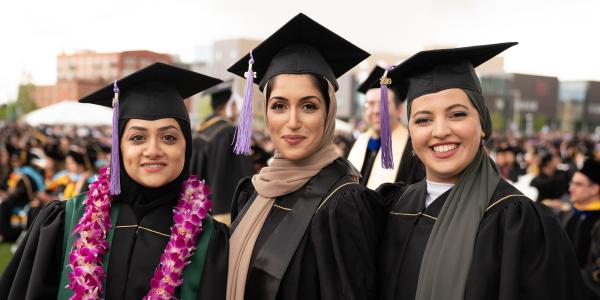We welcome you here.
Interested? Request more information
Credit hours for BA: 120
Full-time, part-time
This degree can be completed completely online
Start terms: fall, spring, summer
With a diversifying workforce and customers, companies, non-profits, and almost every business in the public sector are looking for confident expertise to drive them toward their goals. With a degree in Ethnic Studies from the University of Colorado Denver, we prepare you to provide support and become the authority for your next career move.
The Ethnic Studies program can be completed completely on campus or online. You will develop and sharpen skills in:
- Analysis of and research about various cultures, communities, and institutions
- Creative and critical thinking
- Oral and written communication
The National Association of Colleges and Employers (NACE) has established eight career readiness competencies that employers prefer their employees to have. These include:
- Career and Self-Development
- Communication
- Critical Thinking
- Equity and Inclusion
- Leadership
- Professionalism
- Teamwork
- Technology
Our Ethnic Studies program prepares you to excel in all eight of these areas with special emphasis on Equity and Inclusion, Critical Thinking, and Communication. These skills are essential for and valued in a variety of professional fields including healthcare, education, law, journalism, business, community and union organizing, social work and counseling, publishing, tech, film and television, politics and policy, non-profits and government agencies, and libraries and museums, among others.
Education as a Public Good/Necessity
As part of a Liberal Arts education, robust knowledge of the United States and the broader world requires the study of race, ethnicity, and Indigeneity in their intersections with gender, sexuality, class, religion, nation, and dis/ability. We treat these issues not as many disciplines have done, as parochial or supplementary, but as crucial to any quality education. Ethnic Studies is at the forefront of centralizing race in education. Our curriculum is designed to generate extensive, in-depth knowledge on a broad suite of topics. Our faculty are committed to helping build just, healthy multi-racial democracy. Students build critical thinking, reading, and writing skills as tools to be used in all facets of life. Of special importance to us is honoring the struggles and celebrating the achievements of our predecessors and contemporaries. Their wisdom is a wayfinder through a rapidly- changing, increasingly-complex world. We learn from the past to build futures in which all of us may truly flourish.
Empowerment
Knowledge is valuable in itself but it is best as a means to self- and community empowerment. We are dedicated to providing students with the resources to pursue their curiosities and goals within social and political contexts. Faculty aim to be supportive rather than didactic. We encourage students to design methods appropriate for the issue at hand rather than apply stale theories. Students learn to acquire and produce knowledge in various ways, such as: oral history, literary and media analysis, and community-based participatory research. Through our program, students refine critical and creative thinking, research, and styles of communication. They become remarkably adept at engaging diverse, complex issues in society and the workplace.
Community
At the heart of Ethnic Studies is community. While the university, workplace, and society may feel isolating at times, Ethnic Studies offers a rare space of belonging. We embrace everyone in our community as an important colleague and powerful visionary. We affirm that collaboration is vital for individual growth and communal health. Our lifeways provide distinctive perspectives, and our entanglements enable transformation. Through our curriculum and programming faculty, students, and community members build connections working in collaboration with student, Auraria campus, and community organizations; other CU Denver programs and offices; regional Ethnic Studies programs; and scholars, artists, activists, and teachers from both within and outside the U.S. Among our highest aspirations is to cultivate meaningful, lifelong relationships and to help students develop lifelong skills as local, national, global citizens and leaders to engage in real-world problem solving.
We welcome you here.
A degree in Ethnic Studies sets you apart as a leader in an increasingly complex, multicultural world.
Ethnic Studies is a growing career area
Research different degrees and career trajectories at DataUSA.io
(Screenshot—September 2023)
People with a background in ethnic studies move into many careers. Some join academia, work in public health, education, criminal justice, psychology, community organizing, politics, healthcare or take positions in the fields of social justice or sustainability. Many of our students continue their education in medical, dental, or pharmacy school; as well as law school—especially immigration law. We are extremely proud of our alumni and you can learn about where many have gone post graduation.
Ethnic Studies prepares you for many careers by giving you career readiness competencies (from the NACE). These include:
- Skills in equity and inclusion
- Career and self-development
- Communication skills
- Critical thinking
- Leadership
- Professionalism
- Teamwork
- Technical abilities
Graduate and Professional options
Some of our alumni continue their education with Master's and PhD level degrees in Ethnic Studies and other fields. Our graduates take many paths:
- Law School for careers in law or politics
- Medical School and science based degrees
- Public Policy to aid in careers in economic or community development and policy making
- Pursue your Ph.D.
- Master of Arts or Science in Psychology or their Master of Social Work to become counselors, psychologists, or social workers
- Master in Public Health to go into public policy and healthcare
No matter what career trajectory you are interested in you will find your Bachelor of Arts in Ethnic Studies is a great place to start.
Your Degree in Ethnic Studies
Ethnic Studies: 33 hours
We design our curriculum with your current situation and future in mind. Our non-traditional student base comes from a variety of multicultural and multiethnic backgrounds. We focus on providing the best education to meet you where you are now, and propel you forward in your career and while we do offer on campus courses, you can choose to complete this degree completely online.
Coursework may include:
- African American History
- Social History of Asian Americans
- History of the American Indian
- Chicano/a and Latino/a History
- Research Methods in Ethnic Studies
- Media and Ethnic Studies
- Capstone in Ethnic Studies
Core courses
Additionally you will have core courses to give you a well rounded CU Denver education. These courses give you a better understanding of the issues and skills you need to succeed.
CU Denver Core: 34 Hours
You’ll be educated in:
- English and mathematics
- international and cultural diversity perspectives
- arts and humanities
- behavioral, physical, and social sciences
College of Liberal Arts and Science Core:15 Hours
These courses give you a better understanding of the issues and skills you need to succeed.
Topics include:
- Writing & presenting
- Literature & culture
- Behavioral science
- Social sciences
- Natural and physical sciences
- Mathematics
Electives and/or foreign language proficiency
Foreign language coursework may be satisfied if you’ve taken a certain number of classes in high school. These electives give you the freedom to dive deeper into topics or courses that interest you.
Add a minor in Ethnic Studies to your degree
18 Credit Hours (6 courses)
You will take:
- Introduction to Ethnic Studies (3 credit hours)
- Elective course (3 credit hours)
Then you will take 9 credit hours of upper division courses. One from each of the focal US racial/ethnic groups:
- American Indian Studies
- Asian American—history, selected topics, or contemporary experience
- African American—history, family, or literature
- Chicanos/as and Latinos/as—history, colonial Latin America, or selected topics
There are also minimum GPA requirements.
Current students may declare an Ethnic Studies minor using this form and contacting CLAS Advising.
Get a Dual Degree or add a certificate to your degree
Our program allows you to customize your college experience by getting a dual degree with your BA in Ethnic Studies or adding a certificate to another degree.
Popular dual degrees include Ethnic Studies with:
- Education
- Public Health
- Criminal Justice
- Communications
- Political Science
- Sociology
- Psychology—major or minor
- International Studies
Get a Certificate in Ethnic Studies while working on your degree
- African American Studies Certificate
- American Indian Studies Certificate
- Asian American and Pacific Islander Studies Certificate
- Cultural Diversity Certificate
- LatinX Studies Certificate
Other suggested combinations include:
- Education with an Ethnic Studies endorsement. Consider the Culturally Diverse Learners’ Program. This certificate is also offered at the graduate level through the School of Education
- Ethnic Studies major with a minor in Social Justice
- Ethnic Studies major with an Immigration Studies Certificate
- Ethnics Studies major with Environmental Stewardship of Indigenous Lands Certificate (Scholarships available!)
- Ethnic Studies major with Women and Gender Studies
Upon completion of the Ethnic Studies BA, students will be able to
- Explain theories and histories of marginalization and discrimination. Discuss the implications of biased treatment on contemporary events
- Identify diverse social positions. Analyze how social position affects access
- Describe the evolution and social construction of collective identities
- Be aware of one’s own attitudes and identities in the context of cultural diversity. Recognize the connection between one’s own attitudes and identities and personal and professional interactions
- Summarize the contributions and impact by diverse groups to institutions and society
To learn more about the Student Learning Outcomes for this program, please visit our Ethnic Studies Learning Outcomes page.
The cost of tuition for the BA in Ethnic Studies is different for in-state and out-of-state students. See the link for the current table of rates.
Residents of Western Interstate Commission for Higher Education (WICHE) states may qualify for reduced tuition rates. The Western Undergraduate Exchange (WUE) program requires students to maintain current residency in WICHE state until degree completion.
Scholarships
Each year, CU Denver undergraduate students are awarded over $30 million in scholarships from institutional, local, state, and national sources. Learn more, and apply here.
Other opportunities
Many departments and offices at CU Denver offer student employment (including work-study, student hourly positions) through LynxConnect. Learn more here.
Admission Requirements
If you are an incoming freshman to CU Denver (in-state, out-of-state, and international applicants), you can apply through either the Common Application or the Milo Application. Transfer students will need to submit the Milo Application.
Incoming first-year students
CU Denver requires that students complete the Colorado Higher Education Admission Requirements (HEAR). You will not have to meet all Minimum Academic Preparation Standards (MAPS) for admission, but you will need to complete CU Denver coursework by graduation.
Transfer Students
We have strong connections with other four-year and community colleges. If you have completed more than 24 credits of transferable coursework, you will be evaluated for admission on the basis of your college GPA without regard to your high school performance. If you have fewer than 24 credits, you will be evaluated based on both your high school and college GPAs. For more information and to plan your transfer, see transfer admissions in the admissions office.
If you are in your first or second semester at one of the participating Colorado community colleges and plan to transfer to CU Denver after earning your associate degree, CU Denver Bridge to Bachelors might be a great program for you. To qualify, you must meet the criteria including meeting regularly with your assigned CU transfer advisor while you are attending community college.
International Students
You will need to begin your application through the Office of International Affairs. They will help you manage your application process.
Spring
Domestic Application: January 1
International Applications: Priority is September 15, and Final is October 15
Summer
Domestic Applications: May 15
International Applications: Priority is January 15, and
Final is March 15
Fall
Domestic Applications: August 1
International Applications: Priority is March 15, and
Final is May 15

Making Education Work for All
At CU Denver, making education work for all means breaking down barriers so every learner can succeed. Through inclusive policies, programs, and partnerships, we’re building a culture where opportunity isn’t defined by identity but by ambition and impact. Learn more at our Office of Access and Campus Engagement (ACE)

Find your people
Our students forge strong ties to multiple student organizations that complement our program including:

See your future
My background in ethnic studies has tremendously prepared me for my current career journey, working at Young Aspiring Americans for Social and Political Activism (YAASPA), a nonprofit organization that endeavors to build self-efficacy of youth who desire to make change in communities, pursue social science degrees, or go into social justice careers.
—Chelsea Situmeang, Alumni, 2020
